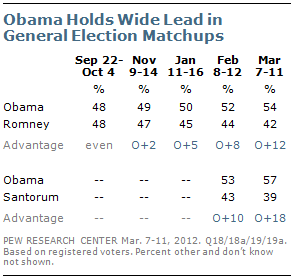
With rising job approval and favorability ratings, Barack Obama also holds a growing advantage in voter preferences as they look toward November. Among registered voters, he currently leads Mitt Romney by 12 points and Rick Santorum by 18 points.
The difference between Romney and Santorum at the head of the GOP ticket mainly affects independents. While independent voters are divided in a race between Obama and Romney (47% vs. 43%), they would favor Obama by a 53% to 39% margin if Santorum is his opponent.
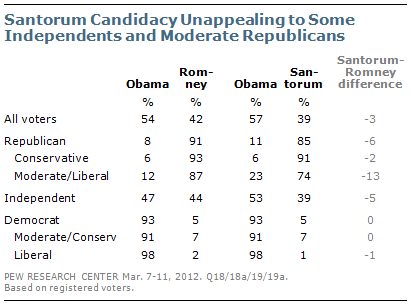
Some moderate and liberal Republican voters would also balk if Santorum becomes the nominee; 23% say they would vote for Obama, compared with 12% who would favor Obama over Romney.
Barack Obama’s lead over Romney is attributable in large part to his wide advantage among women, younger voters, and nonwhites. Women favor Obama over Romney by 20 points – virtually unchanged from a month ago – while men are divided almost evenly (49% Obama, 46% Romney). This gender gap is particularly wide among voters under age 50. Women ages 18-49 favor Obama over Romney by nearly two-to-one (64% to 33%), while men the same age are split (50% Obama, 46% Romney).
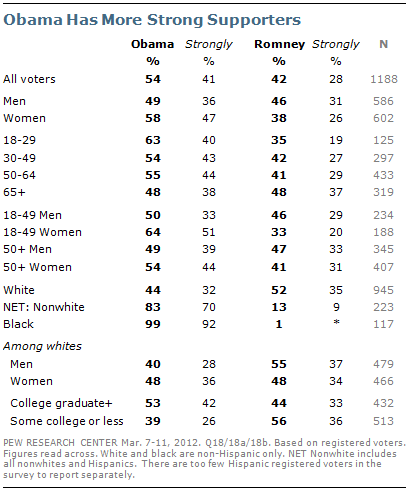
Non-Hispanic whites – who make up roughly three-quarters of the registered voters surveyed – favor Romney over Obama by a 52% to 44% margin. Meanwhile, nonwhites back Obama by 83% to 13%, including 99% of African Americans who support Obama for reelection.
Education remains a substantial divide among white voters; 53% of white college graduates back Obama over Romney, compared with 39% of those without a college degree.
Not only does Obama lead Romney, but more of his supporters back him strongly. Fully 77% of Obama supporters say they back him strongly in a matchup with Romney, representing 41% of voters overall. By comparison, 68% of Romney’s supporters – or 28% of all voters – back him strongly.
Among women, not only do 58% favor Obama, but 47% back him strongly, meaning that more women support Obama strongly than support Romney strongly or moderately (38%).
The GOP Enthusiasm Gap
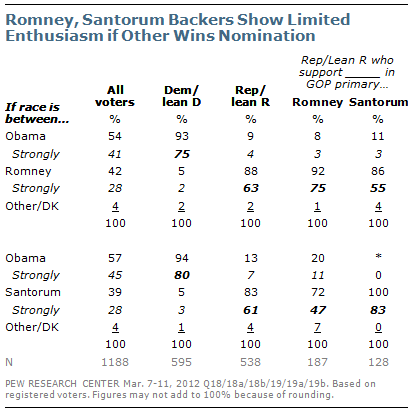
As voters look toward the fall election, Democrats express more enthusiasm for Obama than Republicans do for either of their party’s leading candidates. To be sure, however, this reflects the internal divisions within the party over who would be the best nominee, with each candidate receiving tepid support from those who would prefer to see the other candidate win.
If the general election is between Barack Obama and Mitt Romney, 75% of Democratic and Democratic-leaning voters say they would back Obama strongly, compared with 63% of Republicans and Republican leaners who say they would back Romney strongly.
If Santorum is the GOP nominee, 80% of Democratic voters say they would support Obama strongly, compared with 61% strongly backing Santorum among Republican voters.
Much of this reflects the tepid support among Republican voters who back the other candidate in the primaries. For example, 75% of Romney’s primary supporters say they would back him strongly in the fall – equal to the share of Democrats who strongly back Obama. But just 55% of Santorum’s primary supporters say they would be strong Romney supporters in the fall.
Again, this gap within the GOP is even wider if Santorum is the nominee. Fully 83% of Santorum’s primary supporters would back him strongly in the fall – comparable to the 80% of Democrats who would back Obama strongly over Santorum. But just 47% of Romney’s primary supporters would back Santorum as enthusiastically. In fact, one-in-five (20%) Romney supporters say that, if Santorum is the nominee, they will likely switch sides and support Obama.
Most Predict Obama Victories in the Fall

By a 59% to 32% margin, most Americans think Barack Obama will win the election if Mitt Romney is the Republican nominee. That margin far wider if Rick Santorum is the GOP nominee: 68% think Obama would win, just 24% Santorum.
Confidence among Democratic voters is high regardless of the outcome of the GOP primary – 83% of Democrats and Democratic leaners expect Obama to prevail over Romney, 89% believe he would win over Santorum.
But Republican voters are less confident – particularly if Santorum wins the primary contest. By a modest 60% to 30% margin most Republican and Republican leaning voters think Romney would win in the fall if nominated. But if Santorum is the nominee, about as many Republican voters think Obama would win (43%) as think Santorum would win (46%).
This difference is driven by the views of Romney’s primary backers, most of whom (59%) think Obama would win if Santorum becomes the nominee. By contrast, Santorum’s primary supporters are mostly optimistic about beating Obama regardless of whether Romney (61%) or Santorum (64%) becomes the nominee.
Views of Obama, Romney and Santorum
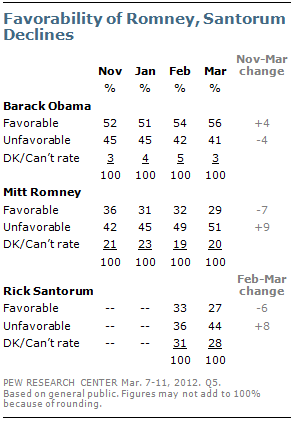
More than half of the public (56%) holds a favorable view of Obama, while 41% have an unfavorable view of the president. This is largely unchanged from last month, but reflects a modest improvement from the start of the year. Impressions of Republican candidates Mitt Romney and Rick Santorum are much more negative, and have grown more negative in recent months.
By a 51% to 29% margin, more Americans hold an unfavorable than a favorable opinion of Mitt Romney. As recently as November, assessments of Romney were more evenly divided (42% unfavorable, 36% favorable), but since then, Romney’s favorable rating has declined seven points while his unfavorable rating has risen nine. Independents, in particular, have developed a more negative view of Romney. In November, 36% of independents viewed Romney favorably, 42% unfavorably. In the current survey, the balance of opinion has slipped to 27% favorable, 49% unfavorable.
More Americans also hold an unfavorable (44%) than favorable (27%) view of Rick Santorum. Just a month ago, about as many held a favorable (33%) as unfavorable (36%) view of the former Pennsylvania senator. Santorum’s favorability has declined across the political spectrum. Currently, more independents view Santorum negatively than positively by roughly two-to-one (47% unfavorable, 23% favorable), compared with a 40% unfavorable, 29% favorable margin last month. And even among Republicans, barely half (53%) view Santorum favorably, down from 61% a month ago, while the share who view him unfavorably rose from 17% to 25%.
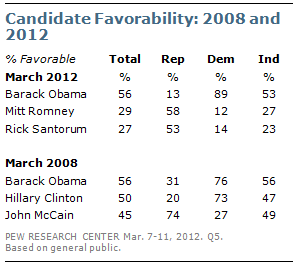
These low ratings for the GOP candidates in 2012 stands in sharp contrast to assessments of the major candidates four years ago. In March of 2008, John McCain was viewed favorably by 45% of Americans, including 49% of independents. Notably, 74% of Republicans felt favorably toward McCain four years ago, compared with 58% and 53% who say the same about Romney and Santorum today.
At 56%, Barack Obama’s overall favorability rating matches public opinion in March 2008. But, not surprisingly, views of him are far more partisan today. Just 13% of Republicans view him favorably, compared with 31% in March 2008. Meanwhile, 89% of Democrats now view him favorably, compared with 76% four years ago. Independent views of Obama today are virtually identical to March of 2008 (53% vs. 56% favorable).
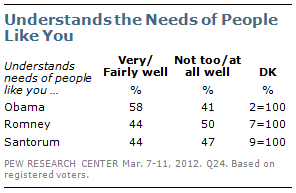
A majority of voters say Obama understands the needs of people like them, while far fewer say this about Romney or Santorum. About six-in-ten voters (58%) say Obama understands their needs either very or fairly well; 44% say this about Romney and Santorum, respectively.
Obama receives lower marks for his positions on the issues, though Romney and Santorum perform slightly worse than does Obama. About four-in-ten (42%) say Obama’s positions on the issues are about right, but about as many (41%) say they are too liberal; 12% say they are not liberal enough. More independents call Obama’s issue positions too liberal (45%) than say they are about right (33%).
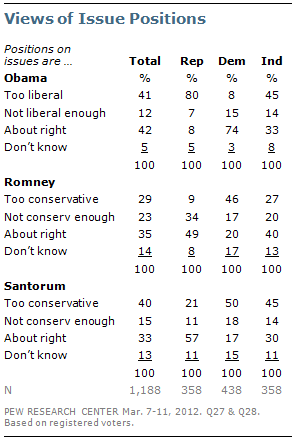
Roughly a third of voters say Romney’s positions on the issues are about right (35%), with criticism of his positions divided between those who say he is too conservative (29%) and those who say he is not conservative enough (23%). Among Republican voters, just 49% say his issue positions are about right, while 34% say they are not conservative enough. Among independents, a 40%-plurality says his stance on issues is about right, 27% say too conservative, 20% not conservative enough.
More voters describe Santorum’s positions on issues as too conservative (40%) than say they are about right (33%); just 15% say they are not conservative enough. A 57%-majority of Republicans say his issue positions are about right. However, among independents more say his positions are too conservative (45%) than about right (30%).